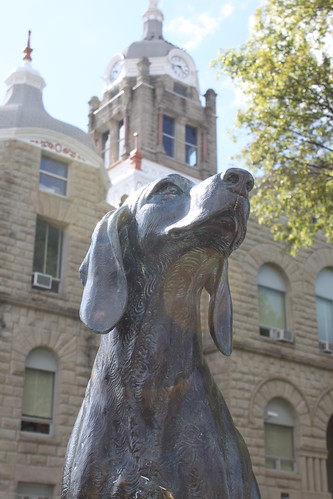
The main intersection of Warrensburg, these days is the interchange of US 50, the main east-west route, and MO 13, the main north south route. 13 passes over 50 with a diamond interchange. If you are taking 50, you can bypass Warrensburg completely. However, 13 will take you through the heart of town, or at least 4 blocks east of downtown, which is the heart of the community, but is no longer the heart of town. You can bypass any community you want in an effort for greater ease and convenience. If you stop and take the time you can find many things. You might even find your freedom.
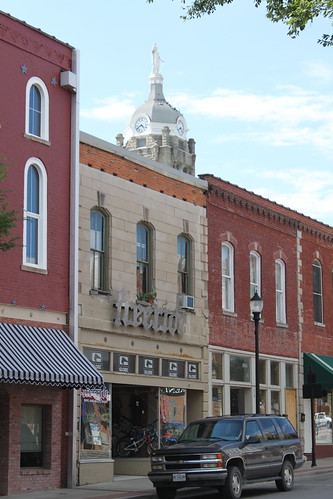
Warrensburg Missouri
Known for Old Drum
Pertle Springs
Pine Street
University of Central Missouri
the B-2 Bomber and Whiteman Air Force Base
Blind Boone
the Teehaus, now known as Cafe Blackadder
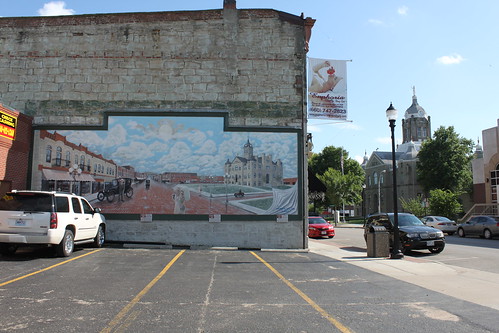
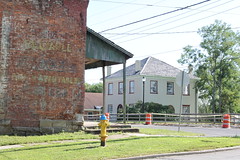

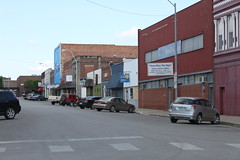
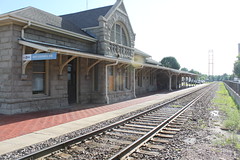
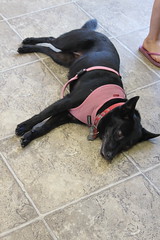 We explored the town as much as we dared in the hot summer sun. We walked north on Holden to Gay, then to the old town hill, where exists the original town square that once bypassed by the Missouri Pacific railroad for an easier grade to the south and east, it was left in a back page of history and memory. This was very common. Many old towns are located miles from where the newer town. Old town Warrensburg still exists within the city limits of Warrensburg on the west side. I regret that the heat kept us from visiting another place of interest within the city -- Blind Boone Park. The effort to even start a park was spearheaded by Sandy Irle, who is the daughter Peggy Means, who passed away 2 years ago after running the Teehaus for many many years, which is now Cafe Blackadder....
We explored the town as much as we dared in the hot summer sun. We walked north on Holden to Gay, then to the old town hill, where exists the original town square that once bypassed by the Missouri Pacific railroad for an easier grade to the south and east, it was left in a back page of history and memory. This was very common. Many old towns are located miles from where the newer town. Old town Warrensburg still exists within the city limits of Warrensburg on the west side. I regret that the heat kept us from visiting another place of interest within the city -- Blind Boone Park. The effort to even start a park was spearheaded by Sandy Irle, who is the daughter Peggy Means, who passed away 2 years ago after running the Teehaus for many many years, which is now Cafe Blackadder....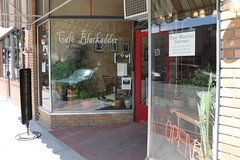
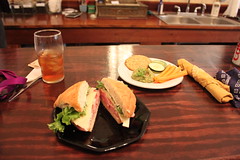
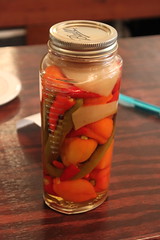
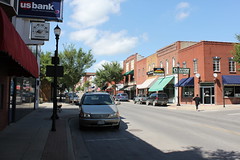
Here, I met Julie Kendall, on her mission to bring art, culture and good wholesome cuisine to a small university town where she lives. That is what brings light and goodness to our world -- people such as Julie taking making a difference in their small corner of it. I shot an svo in December 2009...
On this day, Ken and I felt fortunate and blessed to be able to come to this town, (Ken for the first time) and to be treated to an opening of photographs by Deborah Wilson of some of her travels, mainly in France. Julie welcomed us both and let us know that the spirt that had guided the Teehaus for over 40 years, still lives on in Cafe Blackadder.
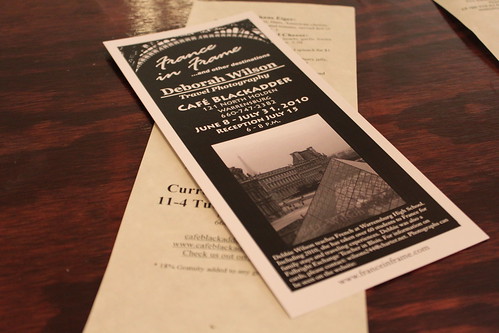
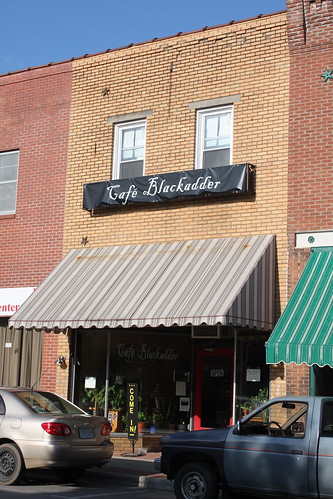
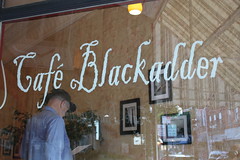
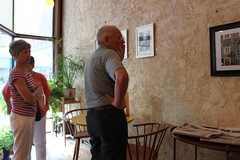

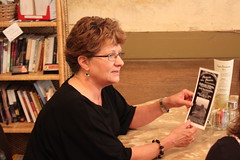

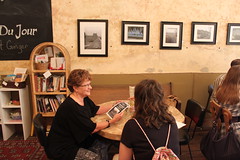
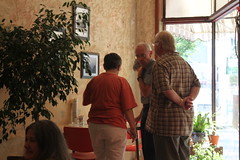
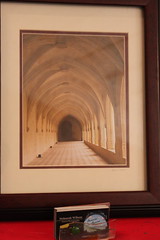
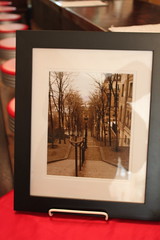
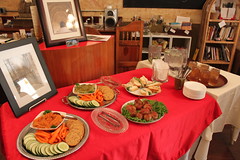
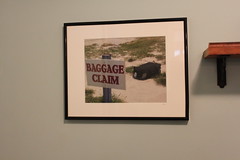
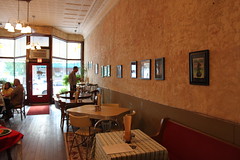
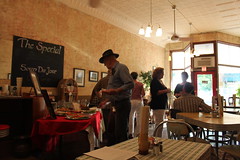
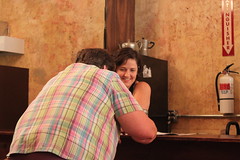
On our way out of town, after spending some time in the hot afternoon sun touristing downtown, then the old town, then going to Cafe Blackadder for an opening of a photographic exhibit, we went past the entertainment area, othewise known as Pine street, which looks like it has hit on hard times as far as the bars go -- most of them seem to be for sale. We "wound the clock" of the courthouse square, what there is of it. Then we headed out on business 50 then 50 highway, saying goodbye to the city as we headed west, and talking about a possible new mission for this blog.
Knobtown
Knobtown is one of these non-existant municipalities that exist on the fringes of municipalities that tend to take up the moral slack of cities that want to zone out sin. The moral slack being that the sin must go somewhere, so non-incorporated towns with no residential areas tend to be that moral safety valve. Knobtown consists of a small strip center, a car dealer, a fruit stand, the no longer used Rock Island raiload bridge, and a strip club. Many men, especially, remember Knobtown for its strip club.
Raytown
Raytown was a tiny crossroads east of the city, until the 1950's suburban growth made it a place to be. Some great examples of googie and mid century modern can be found here. Raytown is not more than 15 or 20 minutes from the heart of the city. This all sounds completely like a chamber of horrors propaganda ad campaign, doesn't it. Raytown has no future. The city routinely chooses sports over art and culture or anything else. Most of the strip malls are completely or nearly abandoned. As in all the inner suburbs of Kansas City, the crime rate is skyrocketing as the population ages, and low income rental properties multiply. The community and it's leaders' reaction to all these problems are unimaginative and weak at best. However, I love the googie, especially the Frontier Motel at the east end of town and the Funhouse snowflake on the west end of 350 highway, the main highway that bisects the town diagonally from southeast to northwest as you are heading west towards Kansas city.
Also, check out this video about a place of the same name as Cafe Blackadder, and perhaps the same place....
Ken's Perspective....
Ken Mountain is my Daytrip partner and he writes....
It was an interesting drive, a lot of gentlemen farms along there -- a lot of new houses with a couple of outbuildings and manicured lawns. A lot have a house or two and the high maintenance white fence that movies have us think of as horse fencing. The closer we got to Warrensburg the more of the gentleman farms that were seen. Just after we got off of I-70, it seemed to be real working farms, but then it soon turned into country estates that obviously never paid their own way.
We arrived in town. A few businesses were on the edge of town -- the type that spring up usually after a Wal*Mart moves in, hoping to get some of the leftover business. After we crossed a river we went three or four blocks down the main street. We found a place to park, and got out to begin our walk. It was a hundred degrees according to the bank thermometer whe we started. We shot a couple of pictures and then we went into the local cafe. Steve has known the owner for quite a long time. We each had a sandwich and talked a bit.
The place is rather interesting. It is sort of a collection of older furniture but doesn't give the impression of fake atmosphere that chain places usually do. They have an old cash register made of brass that they still use. It is supposedly the oldest cash register in Missouri. [Stevo edit here... actually it says the oldest operating National cash register in Missouri on the sign.] They have some books you can borrow and a rack of local ones that are for sale. The local ones are very expensive. There must be a cheaper way to print books in this modern world. After we finished eating we left and wandered around shooting pictures. He shot mostly old buildings where I was shooting buildings that had been remodeled with some sort of fancy material on the front of them. We walked up the street to the north towards the old court house. It is really a big and imposing building. On the top of it is a statue. I haven't figured out what it is supposed to be. It isn't justice as it has no scales and it isn't liberty so I have no idea what it was supposed to represent. They have a large clock tower in the court house that actually still works.
In the front lawn is a statue of a dog. It has a plaque on it with a speech give to a jury. It is quite well known and you occasionally find the speech in books. I didn't read it as it was rather long and the brass was tarnished enough as to make it difficult to read. Apparently it was about a dust up over someone shooting a dog many years ago and they had a big lawsuit over it, and in honor of the famous trial they put up a satue of the dog. They have a new justice center across the street and I am not sure how much the old court house is used anymore.
We continued west. The streets don't always line up around the court house as it was meant to be the center of town, so the streets head right for it, not past it. The old masonic temple is one of the more imposing buildings across the street. They must have had a lot of rich members when they built it. I would be surprised if they can even afford the upkeep on in now even with the lower floor rented out. I doubt if the masons even own it anymore. It must've been impressive when it was build around 1900.
We walked west and ended up at another part of town where the actual original court house was, or at least an earlier one. It was a wooden structure, not terribly impressive. It was where the actual speech to the jury about the dog was actually made. It has a well out back and a school house and a few more buildings that they have moved in to attract tourists.
We walked back to the downtown through what Steve said was the old black part of town. Most houses looked like they were built between 1920 and 1960. They were nice homes, but nothing fancy, just modest serviceable homes. Most seemed to be quite well maintained. We went down a street as we got downtown towards the main street that has a lot of bars on it. I guess that is a necessity in a college town, even if most the kids are suitcase students. A lot of the bars are for sale for some reason. We got back to the main street. I was warm so we sat down on a bench for a rest. We decided to go to the railroad depot just down the street where we could sit in the air conditioning. We sat there for a little while and got cooled off. We then walked back to the cafe. They were having an art opening in the evening so we hung around to see it. It was done by the local french teacher who had take some students to Paris. She had a lot of nice pictures. It is hard to say how many of them were nice because she is a good photographer or how many of them are nice because Paris is such a photogenic city than anyone is going to have nice and interesting pictures when they come back from there. Probably it is due to some sort of combination. They had some free food for the art opening -- some really good stuff there. We finally left and came back via 350 highway. It seems to be a ritzy road and much more interesting with real farms and businesses alongside it.
We got back to pick up Suyen, Steve's wife, at about 8:30 p.m. We were going to go eat BBQ at Oklahoma Joes, but they were already closing, so we went Gates BBQ on Main Street, in Kansas City, Missouri. I think that I prefer Gates to Arthur Bryants, of the famous BBQ places in K.C.
After we ate, we went back to Suyen's work to pick up her car, and we drove to Y.J.'s. We hung there for awhile. Suyen went home, and Steve and I walked around the area and to the Power and Light district. There is nothing there but drinking and the Sprint Center that is too expensive to go in. We walked on back to YJ's to get a drink and sit for a few minutes. David Ford just got back from a trip to New Orleans. We talked to him for a little while. Afterwards, we finally left and headed up to Steve's house. We had walked about 6,000 steps in Warrensburg, according to my pedometer, and about 11,500 total for the day. A walk of about 10,000 steps for the day is considered a good exercise program. I regularly get over 10,000.
At Steve's house, Suyen was waiting with a movie for us to watch. It was called "the Cove." I think it was a documentary about the killing of dolphins in Japan. It was a pretty good movie, but I'm sure it will never be seen by many people. We finished the movie about 2 a.m. and I headed for home.
I got to bed about 3 a.m. I slept until 7:30 a.m. I got up and took my pills. I then decided it was much too early to get up if I had to work all night, so I went back to bed and slept until 11 a.m.
I got up then and started to clean off my desk so I could write this. The thing of beauty for the day I guess would have to be the cafe in Warrensburg, with it's relaxed atmosphere and art exhibit and some very nice people who own and operate it.

In reality, Raytown is a pretty nice place to live, its crime rate is not "skyrocketing," and it's not being overcrowded with poor people. It's sort of like Overland Park without the bullshit and high taxes, and a much nicer place than fuckwads like you conclude after a ten-minute drive through. So take your pretentiousness and shove it directly up your ugly, shitty-font-using, overcrowded website's ass.
ReplyDeleteSeriously. Who uses Impact on a website? The retarded, that's who.